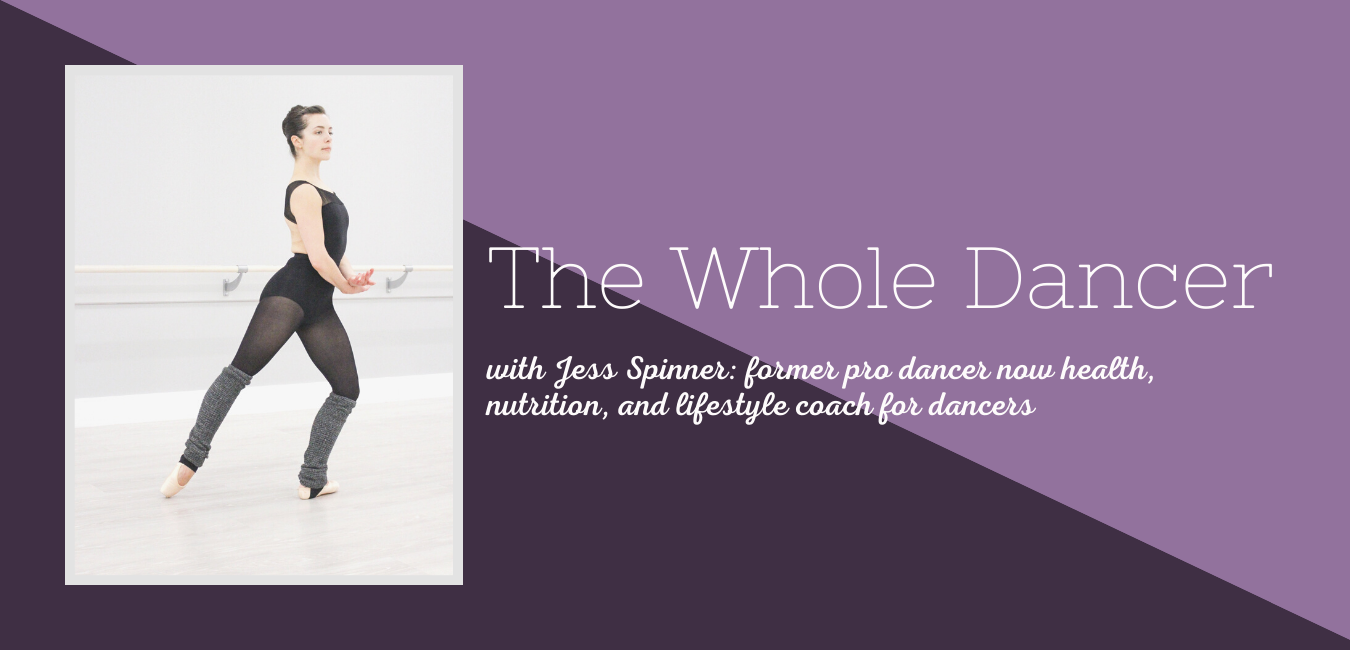This interview features Butler University Dance Graduate, Julianne Blunt. Julianne is in a time of transition moving from college to her first professional job with the Sarasota Ballet Studio Company. We discussed how she maintains balance and what makes her a “Whole Dancer”.
[soundcloud url=”https://api.soundcloud.com/tracks/334020641″ params=”color=f7b6b6&auto_play=false&hide_related=false&show_comments=true&show_user=true&show_reposts=false” width=”100%” height=”166″ iframe=”true” /]
Why don’t we start out with how did you get your start in dance? Tell me a little bit about your journey up until this point!
“So I used to be into gymnastics in middle school, I was never very good at it. So that’s one of the reasons I sort of fell out of love with it so I was looking for a new activity to do so my mom suggested I try taking a ballet class. She did Pilates at the studio near our house and the Pilates teacher also taught dance.
So, that’s how I got my start. I took one class a week, did not know how to do anything, I got kind of a late start there but I increased the classes I was taking and I distinctly remember one day after a recital saying to my parents, ‘you know I think this could be fun to pursue. I’d like to dance professionally.’
My parents luckily have been so supportive my entire life and they said, alright, well I guess we should take the steps to get you there and do what you need to do. I eventually transitioned to a different ballet studio and started training in the ABT curriculum and really upped the intensity with that and after high school I went to Butler University and completed 4 years there as a dance major.
I did the whole audition tour this past semester and I was offered a position with The Sarasota Ballet Studio Company. So, that’s the next step for me coming up here!”
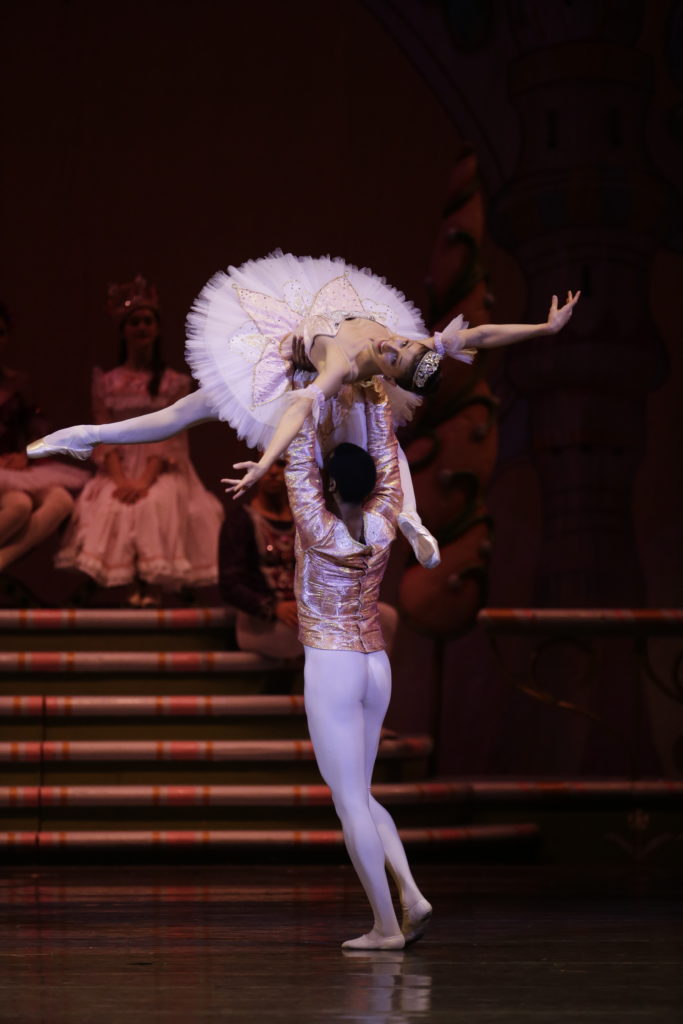
How old were you when you had that recital moment when you decided you wanted to pursue it (dance) more seriously?
“I was probably around 15 years old and then I switched studios when I was 16 and I really upped the intensity around junior year of high school. I was playing catch up for a while. It was kind of a sprint when I switched so I had to hold myself to a high discipline standard so I could get to where I wanted to be.”
I think sometimes realizing later can be better almost because you do have that added pressure to say to yourself, ‘ok I really have to make sure that I do everything I need to do at this point.’
“Yea, definitely. I was able to fully comprehend, here’s the standard I’m held to, here’s what I need to do to work intelligently in class to get me there.
What is your focus on now as you move towards this studio company opportunity which is really exciting. Congratulations!
“Well I’m just in love with classical ballet and I think Sarasota is going to be a great place for that. I’m just excited to immerse myself in the professional lifestyle and it’s a test run. We’ll see…I’m really, really excited. I don’t have one specific focus.
There’s a lot of things going on all at once. I’m transitioning out of the college lifestyle to professional life. Living on my own. I’ll have a roommate which I’m really excited about. Making new friends in a new city, I feel like I’m pinging in every direction a little bit but I’m sure it’ll all come together once I get there.”
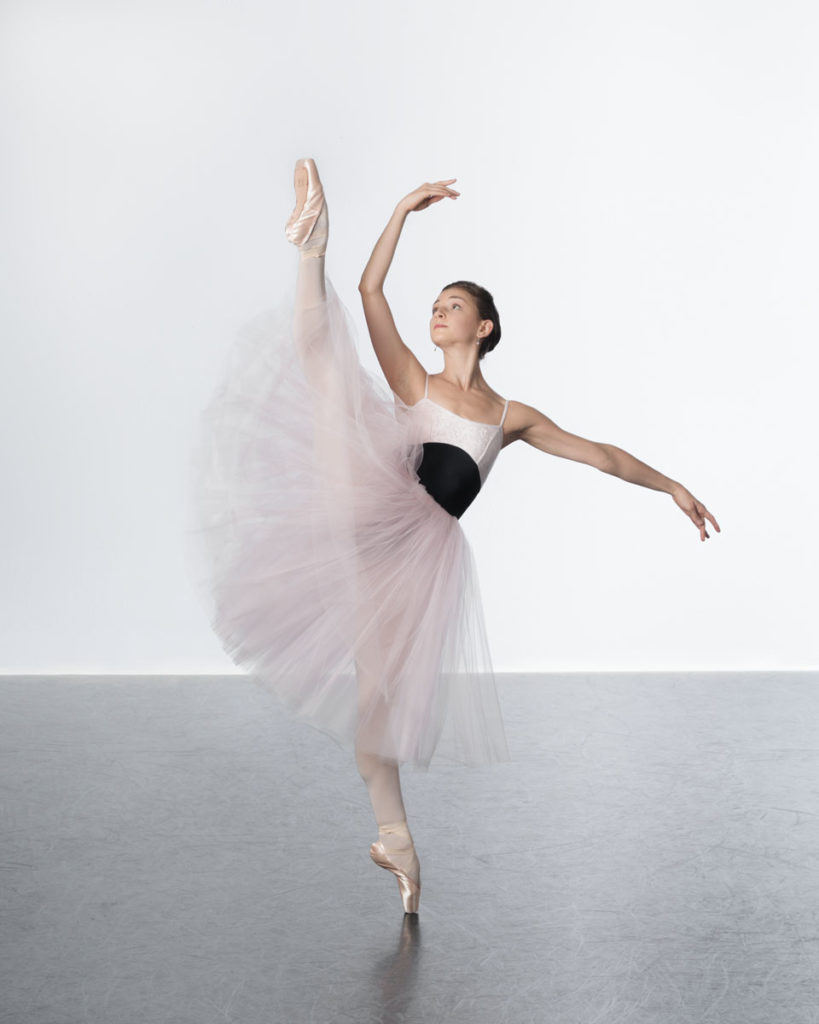
Is the roommate going to be another dancer?
“She is. She’s also joining the studio company. We were able to connect via the company manager.”
What inspires you to dance?
“What I love about ballet is the beauty in the movement and how pure that can be but how it can also have so much expressivity behind it. I think it’s really a unique artistic expression because you’re moving so expansively but there’s also that artistry behind it that varies from dancer to dancer.
Watching different dancers add their own flavor to the role is just incredible and keeps it exciting and interesting and that really inspires me to find my flavor and add it to my performance.”
Have there been any major obstacles that you’ve had to overcome in your journey?
“Sprinting to catch up to the people who had been dancing their entire lives. Trying to get myself to that standard after having such a late start to the ballet world. That was a tough one!”
It’s helpful that you had support from your parents and a network and things like that.
“Yea, I was very very lucky with that. They’re my biggest fans and I love them so much for it.”
What is your eating routine like?
“Well, I really follow a whole foods diet. I don’t think you should deprive yourself of anything. It’s important to be well rounded. So, I got into this whole foods diet initially in high school because I was having a lot of skin issues and that really helped to clear up the acne I was having and my sister had really been educating herself about nutrition and a whole foods lifestyle so she was kinda right there with me, saying why don’t you try this or lets cook this together.
It was nice to have that support system there and I started to realize how great I felt when I wasn’t eating processed foods and was cooking for myself, not eating out too much. I really enjoy it and now I get a lot out of trying new recipes. Trying fun desserts that don’t have as much processed sugar in it. Not limiting any one food group but there’s an abundance of options and I just find that really exciting.”
So you’re at San Francisco Ballet for the summer as an RA. Do you have a cafeteria eating situation going on there?
“We do, yea. We eat right across the street. It’s just a typical dining hall with a couple different options and we go in for breakfast and dinner there.”
How do you navigate that?
“I am a vegetarian, so luckily there’s an option that they have every day. There’s also a pretty well stocked salad bar and actually I went to Trader Joe’s to get some snacks to supplement and get my own salad dressing. I’ll just bring some things in with me. If I want to add a scoop of almond butter to my oatmeal in the morning, I’ll add that to add some healthy fats in there.
They generally have a pretty well rounded option every day. You just have to be able to go outside of the boundaries of what they prescribe so if they say, we’ve got this, this and this option for the vegetarian menu today sometimes I’ll say, you know I only want that and pull from a different section to get something else and piece together the meal that sounds best to me.”
Well, I guess you too have some dining hall experience after being at college.
“Yea, you’ve just got to get creative to make it work. Some days are better than others.”
What does being a healthy dancer mean to you?
“I think to be healthy that goes beyond just diet. I think it includes the people you surround yourself with, the environment you’re in, trying to practice positivity and surround myself with positive people.
Positive friends who, maybe we’ll be venting to each other but ultimately we come to a positive conclusion about how the situation can help us grow in some way. We don’t get down on ourselves because dance is a high pressure career and you can’t get in the mind space of negativity. That will take you down in the long run.
So, just surround yourself with things that make you feel good. That’s what it means really.”
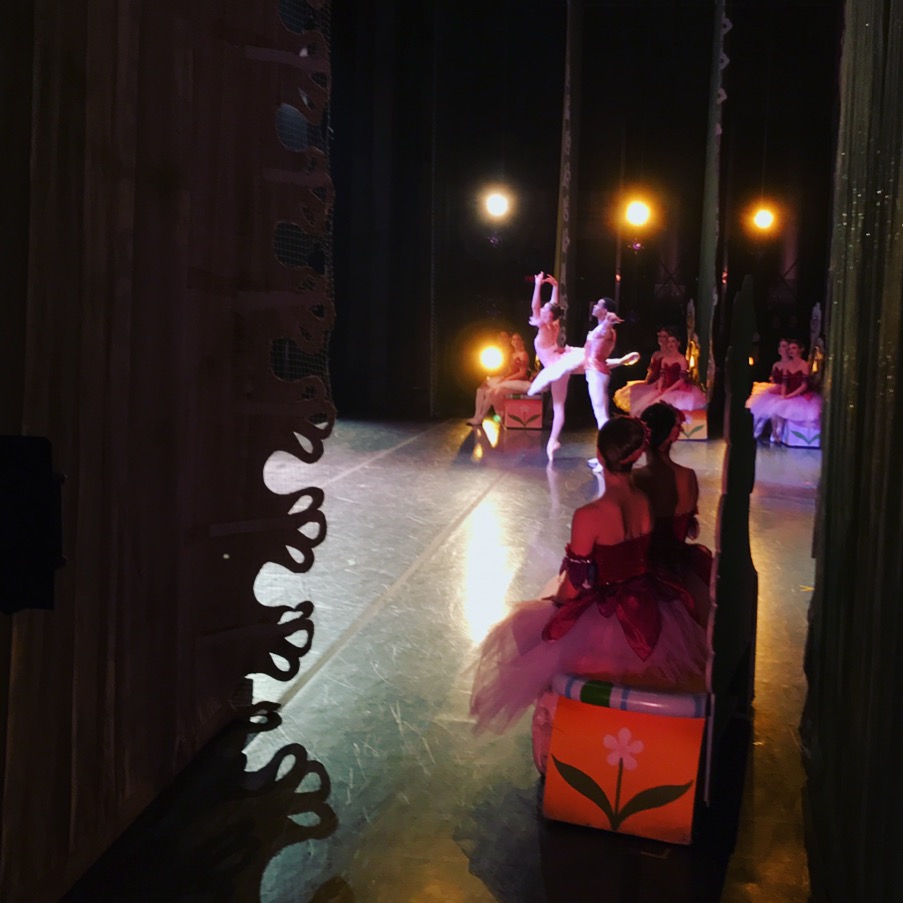
Any time that there have been those people that get stuck in the negativity and don’t seem to want to come out of it. I’ve always tried to kind of distance myself from that because as you’ve said, it’s not conducive to getting far in dance.
“Exactly and you don’t have to cut them out completely but to just check yourself when you’re around them and say no, I can’t get in that headspace as well.”
Do you do any cross – training?
“I do. I really really enjoy yoga. I think that is one activity that moves as expansively as dance. Even though you’re not traveling through space you’re really touching the entire area around you and I really like that even though you’re doing it in a different way it feels great.
I also sometimes go to the gym and do the elliptical a couple of times a week to really get my heart rate up. I think it’s important to have that stamina to get through variations or a tough jumping day. It’s important to have that cardio stamina.
Those are my two main ones. I also really enjoy walking. Ideally I like to be in urban areas. I think it’s just great to keep your circulation going throughout the day and get some fresh air, go for a stroll.”
What is your favorite style of yoga?
“I love vinyasa yoga. Specifically I really like heated although I can’t do that everyday because that’s a lot of sweat for me! I like how vinyasa is almost like choreography, you know, you’re going through a sequence, you do it to the right and to the left. It’s really symmetrical and expansive and I really like that for my body. It still feels like a workout but it’s calming at the same time.”
Have you been doing yoga for a long time?
“Probably 4 years now, I was introduced to it freshman year of college. A professor kind of sprinkled it into one of our conditioning classes.”
How do you maintain balance as a dancer?
“Again, surrounding yourself with things that make you happy. I think it’s really important to have a friend group or person outside of dance. Of course, it’s so easy to talk to other dancers.
We have our inside jokes and we understand the terminology but it’s really important to have people who can offer a different perspective on life because dance might be so foreign to them and they’ll say, ‘wait what? That’s crazy. Tell me more about that.’ and it makes you kind of step back and realize you might be way too in your head about something or you might not have realized how much of an opportunity something was.
Having people outside of the dance world can offer a new perspective and make ballet more meaningful in a way because you see things from a different set of eyes.”
I feel like that’s something you get a lot in the college dance experience. At least at Butler because you’re surrounded and immersed in the college scene. It’s not all dancers all the time so it definitely gives you that perspective.
“Especially in college, you’re taking other courses as well so you’re engaging a different side of your brain and thinking about things differently and cultivating your viewpoints on things, where you stand in life. That also translates into the studio.
I’ve grown as a person throughout my college experience and really matured and have come into my own. That helps me on stage when I’m portraying a character, thinking about how to approach choreography or the process in the studio.”
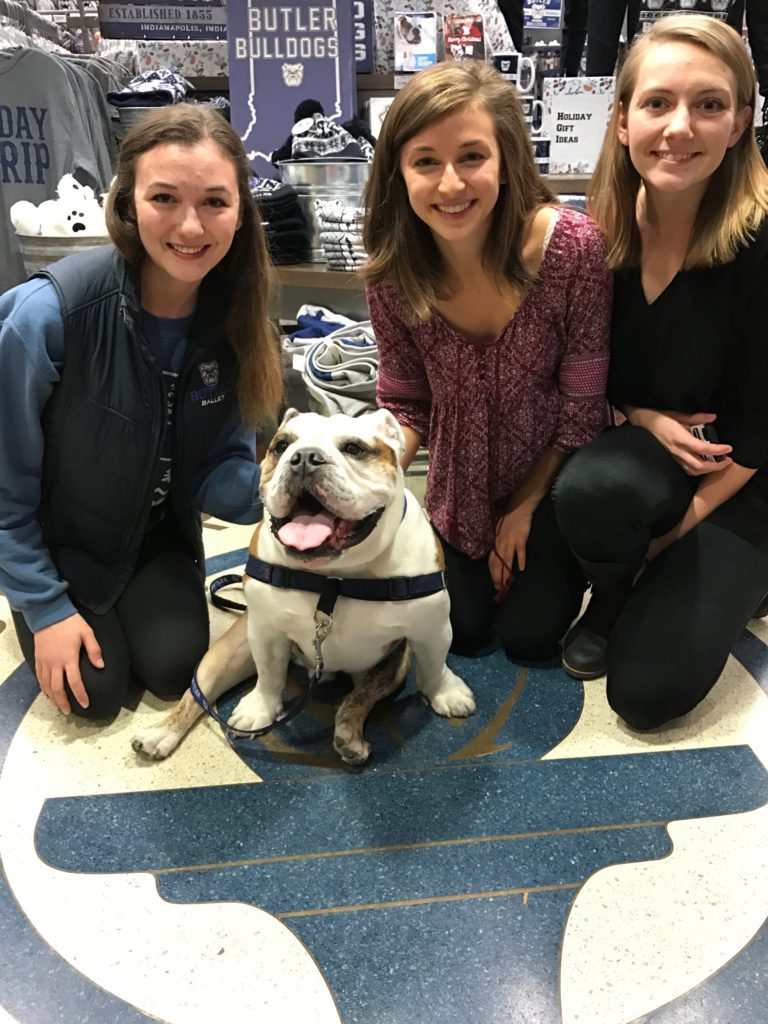
What are your goals in dance? What are you currently working towards or working on?
“My goals right now are pretty broad. I would like a smooth transition into this next phase in life and really contribute to the company and, I’m just going to use your phrasing here, be a “Whole Dancer” and be happy in what I’m doing and feel balanced outside of the studio and fulfilled within it.
I don’t have one specific thing that I’m working on right now…”
With moving to your first company position, it’s important to give yourself that space to just work on the transition and work on doing your best as you get in there. Like you said, it’s an entirely different scenario from where you’ve been.
“Right. Everything is changing now and it’s exciting but it is a little overwhelming so I’m just trying to take it one step at a time.”
Do you have someone who you consider a mentor or anyone who has kind of guided you through your dancing?
“I can’t think of one specific mentor. I was lucky enough to have great relationships with multiple professors at Butler and so they each offer different perspective on things and add different elements to my dancing because they focus on different aspects of it – the artistry vs. the port de bras vs. the footwork. I think that’s made me very well rounded.
Outside of the studio, I think my parents because they’re so supportive and they have a positive outlook and really support my sister and I to achieve our goals. They keep me motivated because they make me happy to pursue what I’m doing even when I’m having down days. We can’t all be on our ‘A’ game every day but when I chat with them they’ll say, ‘remember why you want to do this’ and that kind of lifts me back up again.”
What advice would you give to younger or aspiring professional dancers?
“Be willing to try new things. Not only just steps in the studio because I know it can be scary to try something for the first time but be willing to try new styles. Be willing to accept that correction the teacher gives you that you think isn’t going to help you. Always be willing to give it a try. You can always say, ‘no I didn’t like that’ but you might find something that you really do love and that can push you up to the next level and help to round out your dancing.”
How do you deal with disappointment in dance?
“It can be tricky. There’s a lot of rejection in the dance world and I think talking it out with people outside of the dance world has been most helpful for me because they’re able to say, ‘I get where you’re coming from but there’s more opportunities out there.’
You have to take a step back and say, maybe this isn’t the path that’s meant for me but did I discover something else in the process? Or, is there a different pathway I can take to try and get there or, is there a dance mentor I can talk to who’s been through the same experience. It’s really important to find people who can sympathize with you but who also push you beyond it.”
Yea, you have to stay flexible as you’re going towards your dance goals. What’s the achievement thus far that you’re most proud of?
“Probably cultivating my artistry on stage. That came kind of late for me and you know that’s something artists work on through their entire career but I am very proud of myself for coming out of my shell over the last 4 years especially at Butler. I’ve been pushed to not just smile on stage and do the steps but to really mean it and to find the quirks that I can make my own.
Again, it’s really difficult to do and I’m still working on it for sure, always will be. But I think taking those initial steps, I’m excited to see where I can take it in the future.”
Artistry is a big one. I think that like you said, when we’re younger and it depends on where you’re training and who you’re training with and stuff like that but a lot of times it is just smile and do the steps on stage.
“Right! Like for me in class, it’s so easy to get caught up in the technique of it and say I want to do this right, I want to do 3 turns, I want to get my leg up to here. It’s easy to get in that mindset in class but when you’re on stage you’ve just got to let that part come and then put your mind into performance mode which can be really tricky to do sometimes if you’re worried about the steps or you’re nervous about something.”
What do you think will be the hardest part of being a professional dancer?
“I don’t know, I was going to say the first thing that comes to mind is getting the initial stamina to take class in the morning and then be in rehearsal for many hours. A lot of times probably just standing, you know.
It’s hard to predict, honestly haha. That’s not a very great answer. I think probably building the initial stamina for the change in lifestyle. It’s not like I’ll be taking a ballet class, taking a pointe class, taking a pas class and then calling it a day.
It’s really class and then rehearsal so it’s not as academic feeling but really transitioning into that space of I’ve got to be in performance mode most of the time and be ready to hop on there and fill out the role in the studio not just to concentrate on the steps or the technique of something.”
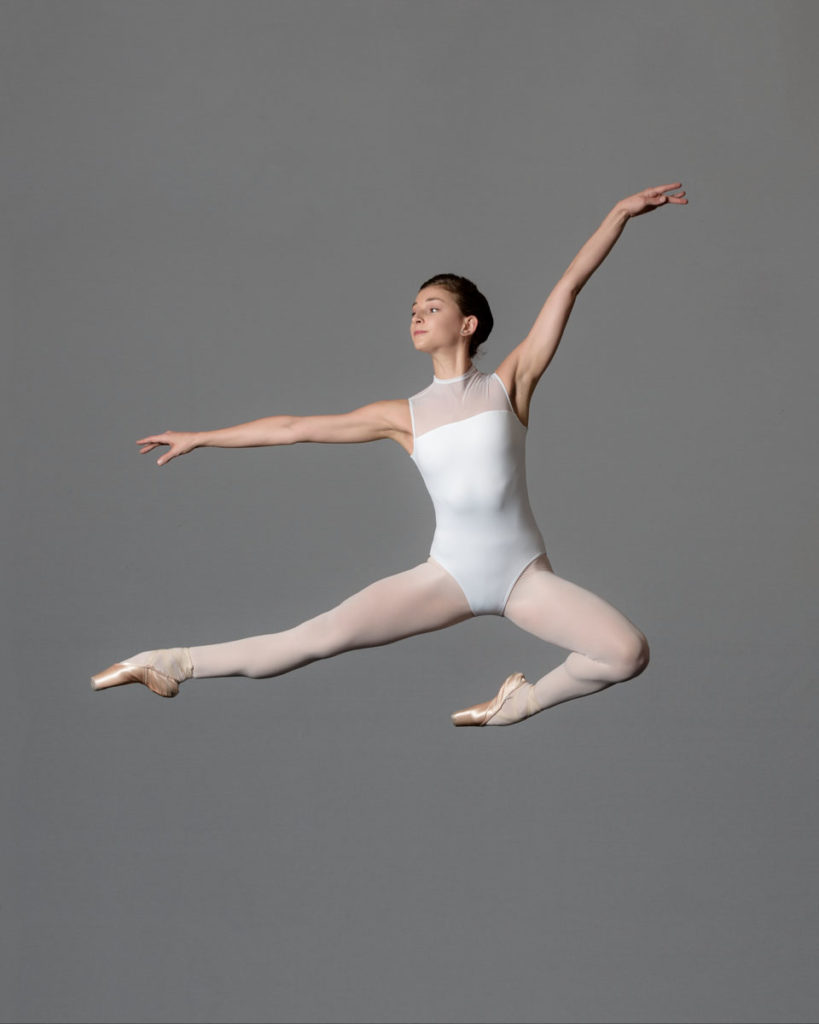
We’ll have to check in with you in 6 – months and see what has been the hardest part of adjusting to your professional job!
“That’s part of the reason why it’s hard to answer that question because I’m not entirely sure what I’m jumping into right now!”
What does being a “Whole Dancer” mean to you?
“I think a ‘Whole Dancer’ is someone who’s balanced inside and outside of the studio. Who can enjoy themselves when they’re in rehearsals and performances but also can enjoy themselves when they’re outside of the studio and has other interests outside of the studio that they pursue with equal fulfillment so that you are taking in the entire world around you and not just becoming a one sided person.”
That’s such a positive shift that I feel has happened in dance in the last I mean, it was after I was in there because 5 – 10 years ago it was very much like, you should just be thinking all ballet all the time. If you want to succeed in this it has to be 100% all you think about all the time. So, I’m glad that it’s recognized by the majority of dancers that I talk to that that shift has to be made and those outside interests are going to enhance what you do in the studio and on stage.
“Yea, cause you never know when you’re just exploring a city or hanging out with friends you might have some experience that you didn’t expect. You might meet someone and experience emotions that you didn’t expect to feel but it can totally translate onto the stage. It’s all just part of maturing as a person.”
Any final thoughts?
“Diet, lifestyle, approach to work – address all aspects of your life and find things that are fulfilling for you in all of those different areas.”
